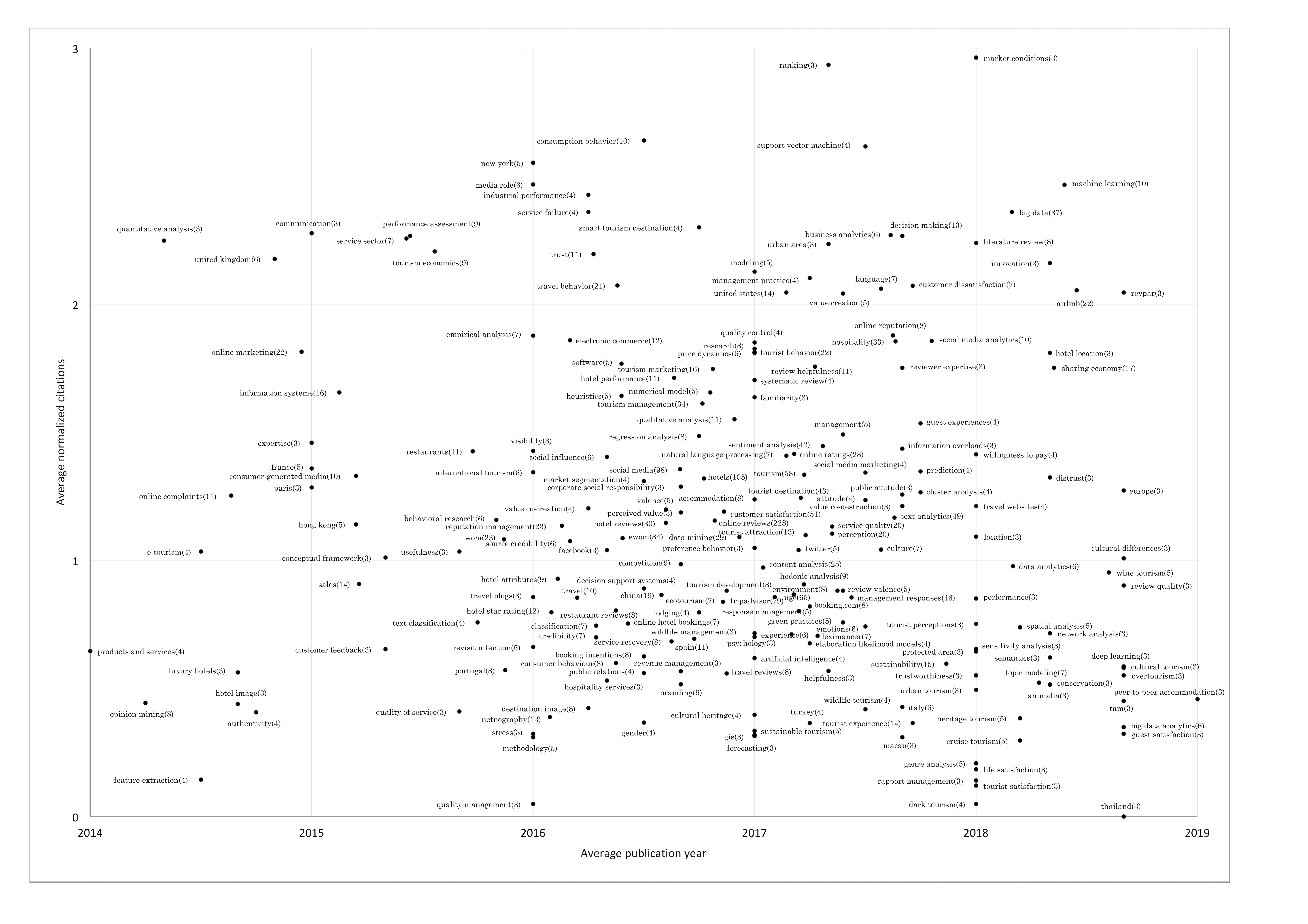Online reviews, also referred to as electronic word of mouth (eWOM) or user-generated content (UGC), are all similar concepts with minor differences. eWOM is all electronic communications between producers and consumers and between consumers themselves: emails, websites, consumer review sites, blogs, virtual communities, chat rooms, newsgroups, and instant messaging. UGC is data generated online by consumers, e.g., text (consumer reviews and blogs) and picture data.
- online reviews
- literature review
- VOSviewer
- Ucinet
- citation analysis
- thematic evolution
- bibliometric analysis
- co-word analysis
- conceptual structure
- science maps
1. Introduction
Tourism and hospitality relies very much on word of mouth among consumers[1]. Before the Internet, this word of mouth was usually obtained from friends and acquaintances, but has now moved to the Internet, with consumers overwhelmingly consulting the opinions of fellow consumers online[2][3]. Their decision-making and travel experience is shaped by the reviews they read, and this has been a significant development in the industry[4].
Consumers use online reviews at every stage of the travel process—pre-trip, during trip, and post-trip—to engage in information search, share experiences, and give feedback[1]. Companies use it for customer engagement, to build online presence, get consumers’ opinions, influence booking intentions, and earn revenue[5][6][7]. With its usefulness to both producers and consumers, it is no surprise that online reviews are a highly popular topic in tourism and hospitality for both researchers and managers[8].
2. Evolution of Research Interests
VOSviewer provides an overlay visualization of a network diagram, which shows the nodes on a network map with a color gradation based on the scores calculated by the software for either the average publication year (APY), average number of citations, or average normalized citations (ANC). To show the impact of the keywords over time in the selected literature in an easy-to-understand timeline view, the calculated figures from VOSviewer were taken and the keyword impact, represented by the ANC, was plotted against publication year (APY).
3. Conclusion
This study used a bibliometric approach to review the research on online reviews in tourism and hospitality by analyzing 632 relevant documents selected from the Scopus database published between 2005 and 2019. The study applied co-citation and co-word analyses, including an innovative visualization of the co-word network to explore the theoretical foundations, network structure, and thematic evolution in this research area. It has successfully carried out an update, reviewed more studies, and revealed the theoretical foundations of the field with the use of science maps and shown the evolution of the major themes in the knowledge area. It has also provided an important quantitative complement with bibliometric methods to the previous literature reviews to enhance the understanding of this fast-growing knowledge area and has validated previous findings, such as the central research themes in online reviews.
This entry is adapted from the peer-reviewed paper 10.3390/su12239977
References
- Fotis, J.; Buhalis, D.; Rossides, N. Social Media Use and Impact during the Holiday Travel Planning Process BT—Information and Communication Technologies in Tourism 2012; Fuchs, M., Ricci, F., Cantoni, L., Eds.; Springer Vienna: Vienna, Austria, 2012; pp. 13–24.
- Wang, Y.; Yu, Q.; Fesenmaier, D.R. Defining the virtual tourist community: Implications for tourism marketing. Tour. Manag. 2002, 23, 407–417.
- Xie, K.L.; Zhang, Z.; Zhang, Z. The business value of online consumer reviews and management response to hotel performance. Int. J. Hosp. Manag. 2014, 43, 1–12.
- Sparks, B.A.; Perkins, H.E.; Buckley, R. Online travel reviews as persuasive communication: The effects of content type, source, and certification logos on consumer behavior. Tour. Manag. 2013, 39, 1–9.
- Sparks, B.A.; Browning, V. The impact of online reviews on hotel booking intentions and perception of trust. Tour. Manag. 2011, 32, 1310–1323.
- Leung, D.; Law, R.; van Hoof, H.; Buhalis, D. Social Media in Tourism and Hospitality: A Literature Review. J. Travel Tour. Mark. 2013, 30, 3–22.
- He, W.; Tian, X.; Tao, R.; Zhang, W.; Yan, G.; Akula, V. Application of social media analytics: A case of analyzing online hotel reviews. Online Inf. Rev. 2017, 41, 921–935.
- Linchi Kwok; Karen L. Xie; Tori Richards; Thematic framework of online review research. International Journal of Contemporary Hospitality Management 2017, 29, 307-354, 10.1108/ijchm-11-2015-0664.

